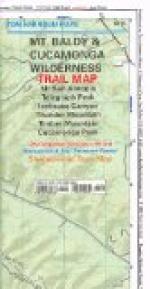Garst, who was an enthusiastic cyclist, with a gurgle of unbelieving mirth, prepared to dispute this. There might have ensued a wordy sparring about caribou versus bicycle, had not the guide been impressed with the necessity for prompt action at the expense of speech.
“We must quit our talk and get a move on,” he whispered, and led the forward march across the bog, his eyes every now and again narrowing into two gleaming slits, as if he were debating within himself, while he studied the ground or some bush which showed signs of being nibbled or trampled. Then he would sweep the horizon with long-range vision.
But not a tuft of hair or glancing horn hove in sight.
The marsh was left behind. The hoof-marks were lost in a wide meadowy sweep of open ground, bounded at a distance by an irregular line of hills, sparsely covered with spruce-trees.
Towards these Herb headed, leaving Katahdin away back in the rear.
“’Shaw! I’m afeard they’re ‘nowhere’ by this time,” he whispered, when the hunters reached the rising ground, glancing at Dol, who stepped lightly beside him.
The boy’s lips parted to breathe out compressed disappointment; but his answer was lost in a sharp whirr! whirr! and a sudden flutter of wings above his head. His eyes went aloft towards a bough about eight feet from the ground. So did Herb’s, and lit with a new, whimsical hope.
“A spruce partridge!” hissed the guide, his voice thrilling even in its stealthy whisper. “That’s luck—dead sure! The Injuns say, ’The red eye never tells a lie;’” and the woodsman pointed out the strip of bare red skin above the beady eyes of the bird, which cuddled itself on its branch, and looked down at them unfrighted.
Dol Farrar, who in this region of moose-birds and moose-calls could believe in anything, felt both his spirits and credulity rise together. He managed to keep abreast of the trained hunter, as the latter, with swift, stretching, silent steps climbed the hill. And he heard the hunter’s sudden cluck of triumph as he reached the top, and looked down upon the valley at the other side, the inarticulate sound being followed by one softly rung word,—
“Caribou!”
“Caribou? They look awfully like quiet Alderney cows, except for the big antlers!” The amazed exclamation stirred the English boy’s tongue, but he did not make it audible.
Following Herb’s example, he stretched himself flat upon his stomach under a spruce, and stared over the brow of the hill at a forest pantomime which was being acted in the valley.
Cautiously slipping from tree to tree, Cyrus and Neal, who had lagged a few steps behind, joined the leaders, and lay low, eagerly gazing too.
On its farther side the hill was yet more sparsely covered, the scattered spruces showing gaps between them where the lumberman’s axe had made havoc. Through these openings, which were as shafts of light amid the evergreen’s waving play, the hunters saw the sun silver a brown pool in the valley. A few maples and birches waved their shrivelling splendors of scarlet and buff at irregular distances from the water. And in and out among these trees moved in graceful woodland frolic four or five large animals,—perhaps more,—their doings being plainly seen by the watchers on the hill.




